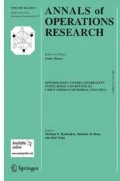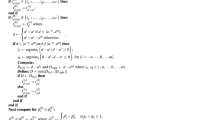Abstract
In this contribution, a two-player constant-sum 2-tuple linguistic matrix game is described, and a linguistic linear programming (LLP) approach is proposed to solve this class of games. The proposed approach can be perceived as a unified mechanism in the sense that it can be adopted to solve linguistic matrix game problems, LLP problems, and linguistic multi-attribute decision-making (MADM) problems. The latter is exhibited by presenting examples of linguistic MADM problems modeled as two-player constant-sum linguistic matrix games with Nature as the second player.
Similar content being viewed by others
References
Aliprantis, C. D., & Chakrabarti, S. K. (1998). Games and decision making., Business and economics Oxford: Oxford University Press.
Arfi, B. (2006a). Linguistic fuzzy-logic game theory. Journal of Conflict Resolution, 50(1), 28–57.
Arfi, B. (2006b). Linguistic fuzzy-logic social game of cooperation. Rationality and Society, 18(4), 471–537.
Balezentis, A., & Balezentis, T. (2011). A novel method for group multi-attribute decision making with two-tuple linguistic computing: Supplier evaluation under uncertainty. Economic Computation and Economic Cybernetics Studies and Research, 45(4), 5–30.
Barron, E. N. (2011). Game theory: An introduction. New Jersey: John Wiley and Sons.
Bauso, D. (2016). Game theory with engineering applications., Advances in design and control Philadelphia: SIAM.
Bector, C. R., & Chandra, S. (2005). Fuzzy mathematical programming and Fuzzy matrix games. Berlin: Springer.
Bector, C. R., Chandra, S., & Vijay, V. (2004). Duality in linear programming with fuzzy parameters and matrix games with fuzzy payoffs. Fuzzy Sets and Systems, 146, 253–269.
Billot, A. (1986). A contribution to a mathematical theory of fuzzy games. In C. Ponsard & B. Fustier (Eds.), Fuzzy economics and spatial analysis (pp. 47–56). Dijon: Librairie del Universite.
Butnariu, D. (1978). Fuzzy games: A description of the concept. Fuzzy Sets and Systems, 1, 1181–1192.
Campos, L. (1989). Fuzzy linear programming to solve fuzzy matrix games. Fuzzy Sets and Systems, 32, 275–289.
Cebi, S., Kahraman, C., & Kaya, I. (2010). Renewable energy system selection based on computing with words. International Journal of Computational Intelligence Systems, 3(4), 461–473.
Chen, Y. W., & Larbani, M. (2006). Two-person zero-sum game approach for fuzzy multiple attribute decision making problems. Fuzzy Sets and Systems, 157, 34–51.
Herrera, F., & Martinez, L. (2000). A 2-tuple fuzzy linguistic representation model for computing with words. IEEE Transactions on Fuzzy Systems, 8, 746–752.
Larbani, M. (2009). Non-cooperative fuzzy games in normal form: A survey. Fuzzy Sets and Systems, 160, 3184–3210.
Larbani, M., & Chen, Y. W. (2014). Improving the game approach to fuzzy MADM. Multiple Criteria Decision Making, 9, 58–71.
Li, D. F. (2014). Decision and game theory in management with intuitionistic fuzzy sets., Studies in fuzziness and soft computing Berlin, Heidelberg: Springer.
Luce, R. D., & Raiffa, H. (1957). Games and decisions. New Jersey: John Wiley & Sons.
Mazalov, V. (2014). Mathematical game theory and applications. New Jersey: John Wiley & Sons.
Morris, P. (1994). Introduction to game theory. Berlin: Springer.
Moura, J., & Hutchison, D. (2017). Survey of game theory and future trends for applications in emerging wireless data communication networks, Working Paper, https://arxiv.org/ftp/arxiv/papers/1704/1704.00323.pdf.
Nagurney, A., Daniele, P., & Shukla, S. (2016). A supply chain network game theory model of cybersecurity investments with nonlinear budget constraints. Annals of Operations Research, 248(1–2), 405–427.
Neumann, J. V., & Morgenstern, O. (1944). Theory of games and economic behavior. New York: Princeton University Press.
Nishizaki, I., & Sakawa, M. (1997). Equilibrium solution in bimatrix games with fuzzy payoffs. Japanese Journal of Fuzzy Theory Systems, 9(3), 307–324.
Nishizaki, I., & Sakawa, M. (2001). Fuzzy and multiobjective games for conflict resolution. Heidelberg: Physica.
Sakawa, M., & Nishizaki, I. (1994). Max-min solution for fuzzy multiobjective matrix games. Fuzzy Sets and Systems, 67(1), 53–69.
Saulo, H., Rêgo, L. C., & Divino, J. A. (2013). Fiscal and monetary policy interactions: A game theory approach. Annals of Operations Research, 206(1), 341–366.
Singh, A., Gupta, A., & Mehra, A. (2015). An AHP-PROMETHEE II method for 2-tuple linguistic multicriteria group decision making. https://doi.org/10.1109/ICRITO.2015.7359374
Vijay, V., Chandra, S., & Bector, C. R. (2004). Bi-matrix games with fuzzy goals and fuzzy payoffs. Fuzzy Optimization & Decision Making, 3, 327–344.
Vijay, V., Chandra, S., & Bector, C. R. (2005). Matrix games with fuzzy goals and fuzzy payoffs. Omega, 33, 425–429.
Wei, G. W. (2010). A method for multiple attribute group decision making based on the ET-WG and ET-OWG operators with 2-tuple linguistic information. Expert Systems with Applications, 37(12), 7895–7900.
Wei, G. W. (2011). Some generalized aggregating operators with linguistic information and their application to multiple attribute group decision making. Computers & Industrial Engineering, 61(1), 32–38.
Acknowledgements
The authors are thankful to the esteemed referees for their valuable suggestions for improving the paper. The authors thank the editor for being supportive and considerate.
Author information
Authors and Affiliations
Corresponding author
Rights and permissions
About this article
Cite this article
Singh, A., Gupta, A. & Mehra, A. Matrix games with 2-tuple linguistic information . Ann Oper Res 287, 895–910 (2020). https://doi.org/10.1007/s10479-018-2810-6
Published:
Issue Date:
DOI: https://doi.org/10.1007/s10479-018-2810-6




